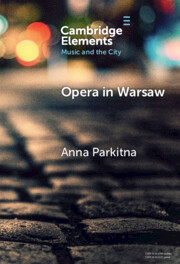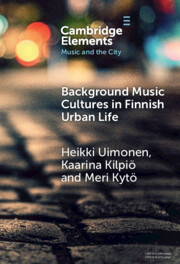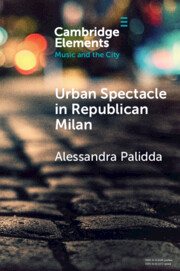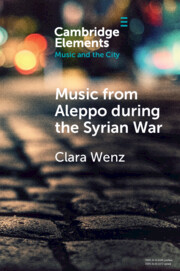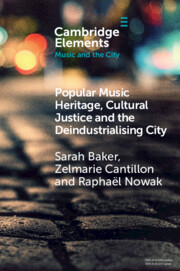About the Series
Music and the City sets urban musical and sonic cultures within new global and cross-disciplinary perspectives.
The series aims to open up new ways of thinking about music in an urban context, embracing the widest diversity of music and sound in cities across the world. Breaking down boundaries between historical and contemporary, and between popular and high art, it seeks to illuminate the diverse urban environment in all its exhilarating and vivid complexity. The urban thus becomes a microcosm of a much messier, yet ultimately richer, conception of the ‘music of everyday life’.
Rigorously peer-reviewed and written by leading scholars in their fields, the short-format texts offer authoritative and challenging approaches towards a fast-developing area of music research. Elements in Music and the City presents extended case-studies within a comparative perspective, while developing pioneering new theoretical frameworks for an emerging field.
The series is inherently cross-disciplinary and global in its perspective, as reflected in the wide-ranging multi-national advisory board. It encourages a similar diversity of approaches, ranging from the historical and ethnomusicological to contemporary popular music and sound studies.
Elements in Music and the City will be of interest not only to researchers and students in music and related arts, but also to a broad range of readers intrigued by how we might understand music and sound in its social, cultural and political contexts.
Cambridge Elements are between 20,000 and 30,000 words in length and are published online, as well as print-on-demand in paperback. The digital first format provides enhanced user experience and easy access to online resources, not only to illuminate these themes but also to inspire further exploration and new interdisciplinary research.
Contact the Editors
If you would like to propose a new Element for Music and the City, please contact one of the editors in the first instance: Simon McVeigh (s.mcveigh@gold.ac.uk) or Abigail Wood (awood@univ.haifa.ac.il).
Elements in this series
About the Editors
Simon McVeigh is Emeritus Professor of Music at Goldsmiths, University of London, and a former President of the Royal Musical Association. His research focuses on British musical life 1700–1945; and on violin music and performance practices of the period. Books include Concert Life in London from Mozart to Haydn (Cambridge) and The Italian Solo Concerto 1700–1760 (Boydell). Current work centres on music in Britain around 1900: a monograph entitled Music in Edwardian London will be published by Boydell in 2024. He is also co-investigator on the digital concert-programme initiative InConcert.
Abigail Wood is Senior Lecturer in Ethnomusicology at the Department of Music, School of Arts, University of Haifa, and past editor of Ethnomusicology Forum. Her research focuses primarily on musical life in contemporary urban spaces, from new musical spaces among religious Jewish women, to the reflection of the Israeli-Palestinian conflict in the contested soundscapes of Jerusalem’s Old City.
Editorial Board
| Karin Bijsterveld | Maastricht University |
| Philip Bohlman | University of Chicago |
| Tim Carter | University of North Carolina at Chapel Hill |
| Sara Cohen | University of Liverpool |
| Jonathan Hicks | University of Aberdeen |
| John Koegel | California State University, Fullerton |
| Frederick Lau | Chinese University of Hong Kong |
| Laudan Nooshin | City, University of London |
| Gascia Ouzounian | University of Oxford |
| Jann Pasler | University of California, San Diego |
| George Revill | Open University |
| J. Griffith Rollefson | University College Cork |
| Matt Sakakeeny | Tulane University |
| Derek B. Scott | University of Leeds |
| Yannick Simon | Université Toulouse - Jean Jaurès |
| Darci Sprengel | University of Oxford |
| Lakshmi Subramanian | BITS Pilani, Goa |
| Benjamin Walton | University of Cambridge |
| Tom Western | University College London |
| Susana Zapke | Music and Arts University of the City of Vienna |

